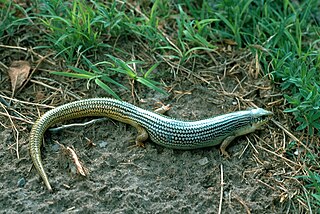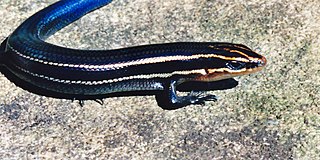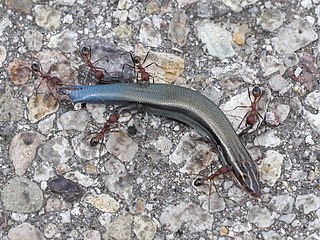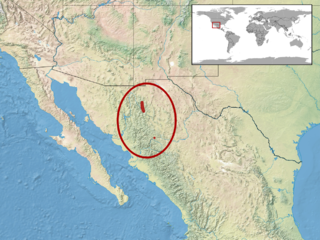
Plestiodon egregius, the mole skink, is a species of small lizard endemic to the Southeastern United States.

Plestiodon anthracinus, the coal skink, is a species of lizard which is endemic to the United States.

The broad-headed skink or broadhead skink is species of lizard, endemic to the southeastern United States. The broadhead skink occurs in sympatry with the five-lined skink and Southeastern five-lined skink in forest of the Southeastern United States. All three species are phenotypically similar throughout much of their development and were considered a single species prior to the mid-1930s.

Plestiodon gilberti, commonly known as Gilbert's skink, is a species of heavy-bodied medium-sized lizard in the family Scincidae. The species is endemic to the southwestern United States, and grows to about 7 to 12 cm in total length.

The Great Plains skink is a species of lizard endemic to North America.

The prairie skink is a species of skink endemic to the prairies east of the Rocky Mountains in North America. It is one of only seven species of lizards that occur in Canada.

The (American) five-lined skink is a species of lizard in the family Scincidae. The species is endemic to North America. It is one of the most common lizards in the eastern U.S. and one of the seven native species of lizards in Canada.

Plestiodon inexpectatus, the southeastern five-lined skink is a common skink in the southeastern United States.

The four-lined skink is a species of lizard, which is endemic to North America. It is a medium-sized member of the Plestiodon skinks.

Plestiodon callicephalus, commonly known as the mountain skink, is a species of lizard, a medium-sized member of the Plestiodon skinks, endemic to North America.

Plestiodon multivirgatus, commonly known as the many-lined skink, the northern many-lined skink, or the variable skink, is a medium-sized species of lizard, a member of the North American skink genus Plestiodon in the family Scincidae. The species is native to the western United States.

The Bermuda skink, longnose skink, or Bermuda rock lizard is a critically endangered species and the only endemic land-living vertebrate of Bermuda. It is a relatively small skink : adults reach an average snout-to-vent length of about 8 cm (3.1 in).

Plestiodon is a genus of lizards in the family Scincidae (skinks). The genus contains many species formerly classified under the genus Eumeces, except those now placed in Mesoscincus. They are secretive, agile animals with a cylindrical body covered with smooth, shiny scales. They are distributed from East Asia to throughout North America from southern Canada south to Mexico, including oceanic islands such as Bermuda.

Kishinoue's giant skink, also known as the Japanese skink, is a species of skink, a lizard in the family Scincidae, endemic to the southern Ryukyu Islands of Japan.
Blue-tailed skink may refer to:

Plestiodon elegans, the five-striped blue-tailed skink or Shanghai elegant skink, is a species of lizards in the genus Plestiodon found in East Asia.
Paraplacosauriops is an extinct genus of anguid lizards from the middle Eocene of France.

Plestiodon dugesii, also known commonly as Dugès' skink, Duges's skink, and eslabon in Mexican Spanish, is a species of lizard in the family Scincidae. The species is endemic to Mexico.

Plestiodon japonicus is a species of lizard which is endemic to Japan. The IUCN lists the species as least concern.

Plestiodon multilineatus, the Chihuahuan skink, is a species of skink. It is endemic to the state of Chihuahua, Mexico.

















